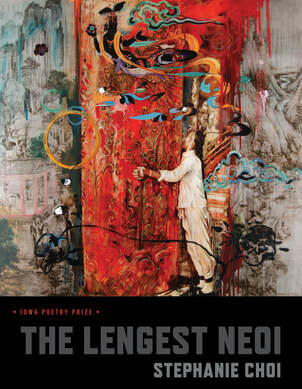The Lengest Neoi

She's arrived! Order HERE!
"Here Are the Poetry Books to Read in 2024"—Lithub
"7 Poetry Collections that Transform the Personal into Portals"—Electric Literature
“The Lengest Neoi is a shock to the senses: reminding readers that to write and live through / amid/ between languages is to make new combinations of reality at every turn and that it is a chance to leave the ordinary dimensions of poetics / experience in the dust. Tech fails disconnect a grandmother from her granddaughter, and language play reveals a dramatic history of a family name. Poet Stephanie Choi, having connected body and mind through time and generations, mother tongues and lost lineages, can also make prismatic, melodic, gorgeous stories in emails, crossword puzzles, text chains, lists, and laments. This poet is wily, radical, fluidly ingenious with words, image, emotion. She has to be: there are so many ways to erase Asian American life / perspective / creations, to knock down each individual granddaughter, erase each artist. This poet reinscribes all with nuanced brilliance, photographic sensory memory, and fierce love. She must attend to what needs attention: fix the spine, fix the teeth, speech therapy to fix the impediment. The poet emerges with a voice that has no interest in being fixed: This poet can see from the perspective of her lineage/languages, can see much farther into the past, throw her voice far into the future.”—Brenda Shaughnessy, judge, Iowa Poetry Prize
“This is an ambitious debut that brings together issues of language loss through assimilation and acculturation, the connection between race and disability, and issues of transcultural Asian and Asian American identity and representation. In a nation where the Asian individual is not always seen as a separate identity but a metonym for a larger nation and community, how does the second-generation Chinese American distinguish herself as a person with agency and particularity, even as she respects that her condition has been shaped by and fundamentally connected to larger historical forces? Likewise, how might a particular physical disability, such as a speech impediment, intersect with socially imagined and reinforced disabilities, such as racial or sexual difference? Formally playful, intellectually rich, Choi’s poems deftly explore these and other issues in devastating but also imaginatively playful forms that reveal the many identities a hyphenated self must inhabit and traverse.”—Paisley Rekdal, University of Utah
“‘Remnants, I remember thinking, was a good word,’ writes Stephanie Choi in her assured debut, The Lengest Neoi. Indeed, this collection gathers remnants, which is to say proof of loss. Lyric after precise lyric, what stays—an infant’s teeth, blight-marred tree stumps, the poet’s black hair, a back brace. Even ‘Choi’ becomes what’s left, rather than what is, cast-off of a past her tongue can only name, not pronounce. The elegiac mood permeates as parents of parents fret after their children of children, imagining death as present as weather, present in their absence. With crystalline yearning, Choi maps the gaps between herself and her family, distances like blank lines in a poem; she, too, a remnant, searching for all she’s lost.”—Douglas Kearney, author, Sho
“How does the past live on inside us? This is an illuminating collection of loss and location, about what’s revealed in mistranslation, and about how to make sense of the many pasts that inform our fate, without ever constricting our future. Stephanie Choi’s work is a bright reckoning with history and identity, discovery, grief, and love—and I hope this book is only the first of many more to come.”—Joshua Marie Wilkinson, author, Bad Woods
